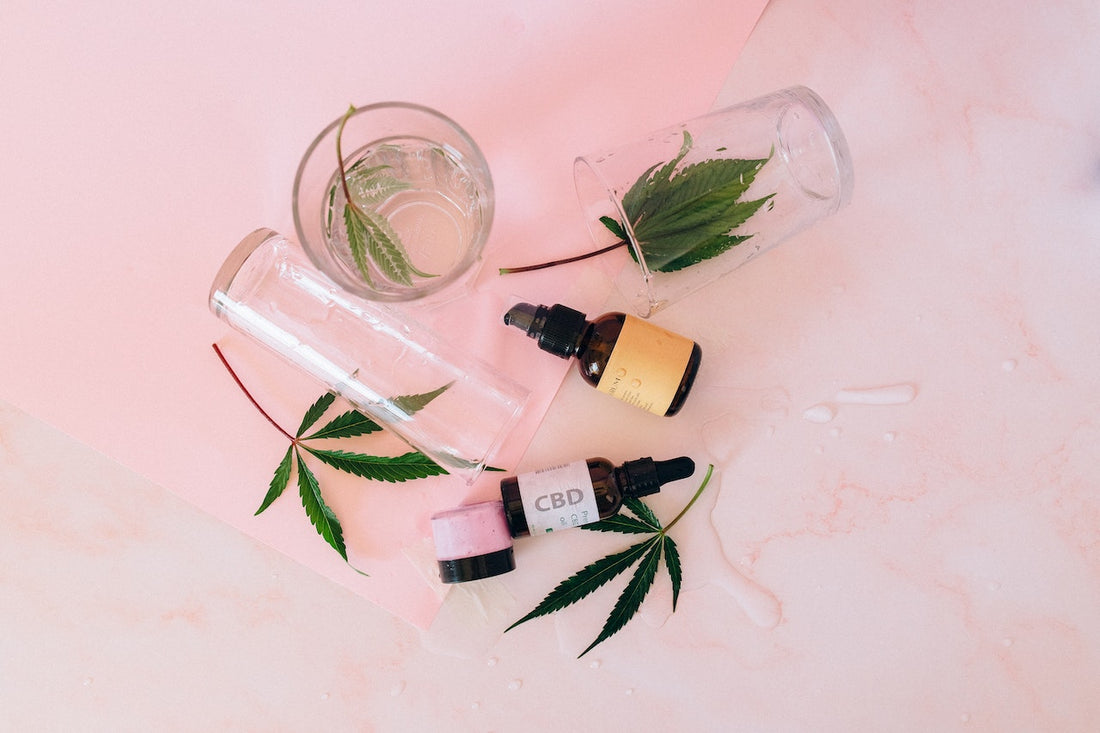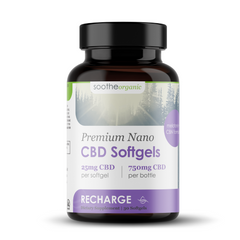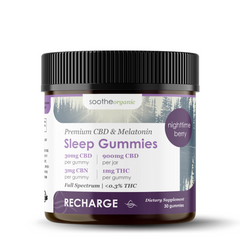The cannabis industry has exploded in popularity, driven by growing legalization and acceptance worldwide. Two key players in this space are THC (tetrahydrocannabinol) and CBD (cannabidiol), the most prominent cannabinoids found in the cannabis plant. Each offers unique effects, benefits, and risks, making them hot topics for both recreational and therapeutic users. Whether you're exploring CBD topical cream for soothing relief, CBD gummies for pain relief, or delta 9 THC gummies for a euphoric experience, understanding the differences between THC and CBD is crucial.
This comprehensive guide dives into the science, effects, and potential risks of THC and CBD, with a focus on products like CBD oil for pain relief, CBD for joint pain, and THC gummies delta 9. We'll also highlight trusted resources and link to Soothe Organic’s Blackberry Lime THC Gummies for those interested in high-quality, organic cannabis products.
Key Takeaways
-
THC is psychoactive, causing euphoria but potentially impairing cognition and motor skills. It may pose risks to mental health at high doses.
-
CBD is non-intoxicating, offering potential benefits like stress relief, improved sleep, and support for joint painwithout the "high."
-
Both cannabinoids interact with the endocannabinoid system but in distinct ways, affecting their therapeutic potential.
-
Always choose reputable, third-party-tested products, like those from Soothe Organic, to ensure safety and quality.
-
Consult a healthcare professional before using CBD or THC, especially if taking medications, to avoid interactions.
THC vs. CBD: What’s the Difference?
THC: The Psychoactive Powerhouse
THC is the cannabinoid responsible for the "high" associated with cannabis. It binds strongly to CB1 receptors in the brain and central nervous system, altering perception, mood, and cognition. This interaction can lead to:
-
Euphoria and relaxation: THC stimulates dopamine release, creating pleasurable sensations.
-
Impaired functions: Memory, coordination, and motor skills can be affected, making activities like driving unsafe.
-
Potential risks: High doses may cause anxiety, paranoia, or hallucinations. Long-term use, especially in adolescents, may impact brain development.
Products like delta 9 THC gummies or THC gummies delta 9 (e.g., Soothe’s Blackberry Lime THC Gummies) deliver controlled doses for recreational or therapeutic use, but caution is advised due to THC’s psychoactive effects.

Mechanism of Action
Both THC and CBD interact with the endocannabinoid system (ECS), a network of receptors regulating mood, pain, sleep, and immunity. However, their mechanisms differ:
-
THC: Binds directly to CB1 and CB2 receptors, mimicking the body’s natural endocannabinoids. This strong binding causes psychoactive effects and alters brain function.
-
CBD: Does not bind directly to receptors but influences the ECS indirectly. It may enhance endocannabinoid signaling, reduce inflammation, and modulate serotonin activity, contributing to its therapeutic effects.
Further research is needed to fully understand these mechanisms, but studies like those from the National Institute on Drug Abuse provide valuable insights into cannabinoid interactions.
Potential Benefits
THC Benefits
THC’s psychoactive effects make it appealing for both recreational and medical use. Potential benefits include:
-
Pain relief: THC may help manage chronic pain, as noted in a 2020 study.
-
Appetite stimulation: Often used for conditions like cancer or HIV, THC can boost appetite.
-
Stress relief: Low doses may promote relaxation and euphoria.
Explore Soothe Organic’s Blackberry Lime THC Gummies for a delicious, organic THC experience.
CBD Benefits
CBD’s non-intoxicating nature makes it a versatile option for wellness. Key benefits include:
-
Pain and inflammation: CBD topical cream and CBD oil for pain relief may reduce discomfort, particularly for CBD for joint pain, as supported by a 2018 study.
-
Anxiety and sleep: CBD may improve sleep quality and reduce anxiety, per Frontiers in Psychiatry.
-
Neuroprotection: Early research suggests CBD may protect against neurodegenerative diseases.

Potential Risks
THC Risks
While THC offers benefits, its psychoactive effects carry risks:
-
Cognitive impairment: Memory and attention may be affected, especially with chronic use.
-
Mental health: High doses can trigger anxiety, paranoia, or psychosis, particularly in susceptible individuals.
-
Motor skills: THC impairs coordination, increasing risks for activities like driving.
-
Adolescent brain development: Regular use in young users may alter brain structure, per Harvard Medical School.
CBD Risks
CBD is generally safe but not without risks:
-
Drug interactions: CBD can affect liver enzymes (CYP450), altering the metabolism of medications like blood thinners.
-
Side effects: Mild issues like dry mouth or drowsiness may occur.
-
Quality concerns: Unregulated products may contain contaminants. Always choose third-party-tested options from trusted brands like Soothe Organic.
Consumption Methods and Effects
The method of consumption impacts the onset, intensity, and duration of THC and CBD effects:
-
Inhalation (smoking/vaping): Fast onset (minutes) but shorter duration (2-4 hours). Common for THC.
-
Edibles (e.g., delta 9 THC gummies, CBD gummies): Slower onset (30-60 minutes) but longer-lasting effects (4-8 hours). Try Soothe’s Blackberry Lime THC Gummies for a precise dose.
-
Topicals (e.g., CBD topical cream): Localized relief for joint pain with minimal systemic effects.
-
Oils/tinctures: Flexible dosing with moderate onset (15-45 minutes).
Choose a method based on your needs and consult dosing guidelines from reputable sources like Leafly.
Legal Status
The legal status of THC and CBD varies globally:
-
United States: CBD derived from hemp (0.3% THC or less) is federally legal, but THC remains a Schedule I substance, though legal in some states for medical/recreational use.
-
Europe: CBD is widely legal; THC is heavily regulated.
-
Other regions: Laws range from full prohibition to regulated medical use. Check local regulations via NORML.
Frequently Asked Questions
Can THC or CBD interact with medications?
Yes, both can interact with medications metabolized by the liver’s CYP450 enzyme, potentially altering their effectiveness. Consult a doctor before combining CBD oil for pain relief or THC gummies delta 9 with prescriptions.
Can CBD help with THC addiction?
Preliminary studies, like one from Addiction Journal, suggest CBD may reduce cannabis withdrawal symptoms, but more research is needed. Comprehensive treatment, including counseling, is recommended.
What are the long-term effects of THC on the brain?
Chronic THC use, especially in adolescents, may impair memory, attention, and prefrontal cortex development, per Nature Reviews Neuroscience.
How does consumption method affect THC/CBD duration?
Edibles (e.g., CBD gummies for pain relief) last longer than inhalation. Topicals like CBD topical cream provide localized, non-systemic relief.
Conclusion
THC and CBD offer distinct effects and benefits, from the euphoric high of delta 9 THC gummies to the soothing relief of CBD for joint pain. While THC carries psychoactive risks, CBD is a safer, non-intoxicating option for wellness. Always choose high-quality, third-party-tested products like those from Soothe Organic and consult a healthcare professional to ensure safe use.
For a premium THC experience, try Soothe’s Blackberry Lime THC Gummies, crafted with organic ingredients for a delightful, reliable dose.
Trusted Resources and Further Reading
-
National Institute on Drug Abuse: Cannabis
-
World Health Organization: CBD Report
-
PubMed: THC and Pain
-
PubMed: CBD and Inflammation
-
Frontiers in Psychiatry: CBD and Anxiety
-
Harvard Medical School: Cannabis and Brain Health
-
Addiction Journal: CBD and Cannabis Addiction
-
Nature Reviews Neuroscience: THC and Brain Development
-
Leafly: Cannabis Dosing Guide
-
NORML: Cannabis Laws
-
Project CBD: Cannabinoid Science
-
Journal of Clinical Investigation: ECS Overview
-
Mayo Clinic: CBD Safety
-
Healthline: CBD vs. THC
-
Medical News Today: Cannabis Benefits
-
Cannabis and Cannabinoid Research Journal
-
American Academy of Neurology: Cannabis and Pain
-
FDA: CBD Regulation
-
European Journal of Pain: CBD and Arthritis
delta 9 gummies near me, delta 9 gummies wyoming, delta 9 gummies, best delta 9 gummies, strongest cbd gummies, gummies for sleep, best sleep gummies, sleep gummies for adults, nano cbd, nano cbd softgels, full spectrum cbd softgels, broad spectrum cbd softgels, green spectrum cbd gummies, cbd energy drinks, cbd mocktails, cbd for muscle recovery, cbd for better sleep, is cbd legal in wyoming, best cbd casper, cbd gummies casper, thcv gummies casper, cbd tinctures wyoming, delta 9 gummies wyoming, best cbd softgels Wyoming, CBD oil Casper Wyoming, Casper CBD store, CBD gummies Casper, CBD tinctures Casper, Hemp-derived CBD Casper, CBD products in Casper, Best CBD shop Casper, CBD capsules Casper Wyoming, Casper CBD hemp products, CBD for sale Casper






